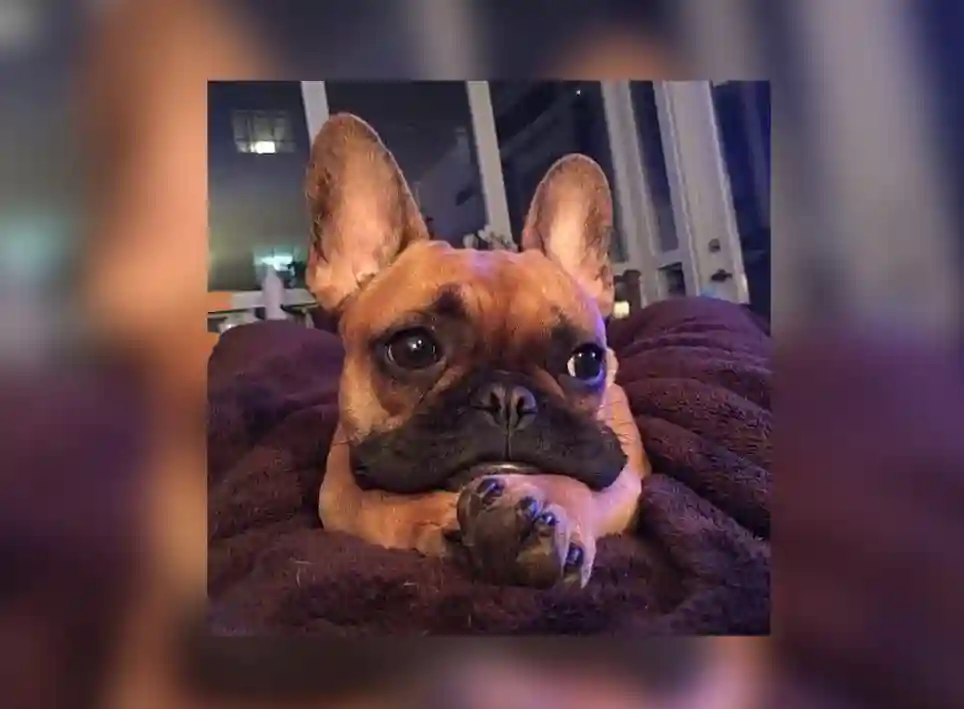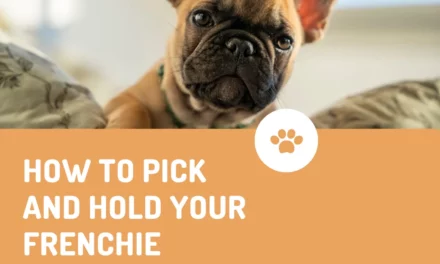Do Frenchies have separation anxiety

Ever experienced the ecstatic welcome of your French Bulldog at the door? That boundless love can sometimes translate into an aversion to your departure, leading to what’s known as separation anxiety.
French Bulldogs, more than many other breeds, struggle with solitude. Leaving them alone, even for a short while, can trigger distress.
Are you noticing your Frenchie’s behavior shift dramatically when you’re away?-
Wondering why they seem to struggle more than other dogs with being apart?
In this article, we’ll explore the causes behind French Bulldog separation anxiety, identify its symptoms, and provide actionable solutions.
Let’s uncover why they find it tough to be alone and discover ways to make their alone time less daunting

IN BRIEF :Typically, French Bulldogs struggle with being left alone for an entire day. Just like people, some Frenchies are more attached than others. Those with higher separation anxiety might worry they’ve been abandoned forever, thinking their owner won’t
HOW CAN WE DEFINE ANXIETY SEPARATION ?
UNDERSTANDING FRENCHIES SEPARATION ANXIETY
If your Frenchie throws a tantrum every time you leave, it could be suffering from separation anxiety.
Dealing with this distressing behavior can be challenging, but there are steps you can take to help your Frenchie cope better.
French Bulldogs are famously affectionate and prone to becoming overly attached, making them more susceptible to separation anxiety.Their breed traits lean towards being human companions, making prolonged
periods of solitude a struggle for them. Leaving them alone for extended hours can lead to unhappiness.Separation anxiety is a behavioral issue unique to your absence.
Unlike basic training problems, such as inadequate toilet training, separation anxiety triggers symptoms like defecating indoors, destructive behavior, excessive barking, and howling when left alone.
Punishing or scolding your Frenchie for separation anxiety won’t resolve the issue.

Do French Bulldogs do well alone? Generally, no. If your schedule involves long hours away from home, a Frenchie might not be the ideal pet choice for you.
To tackle separation anxiety, consider positive reinforcement methods. Offer special treats or toys when you leave, create a comforting environment by leaving on the TV or radio, and gradually desensitize them to departure cues like keys jingling or wearing a coat.
Patience and consistency are key during this process. It’s natural to feel frustrated, but with dedication and positive reinforcement, improvements can be achieved over time.
Before delving into solutions for French Bulldog separation anxiety, let’s delve into its symptoms, helping you identify if this issue resonates with your Frenchie’s behavior
French Bulldog Separation Anxiety Symptoms
Many behaviors linked to separation anxiety might initially seem like traits of a mischievous and unruly personality that we often encounter in dogs.
Yet, if your Frenchie behaves impeccably while you’re present, yet wreaks havoc on your furniture and blinds the moment you leave, it’s probable that your dog is grappling with separation anxiety.
Here are several symptoms frequently linked to separation anxiety in French Bulldogs:

Digging and Scratching at Doors, Walls, or Windows
When a French Bulldog experiences separation anxiety, it may resort to excessive digging or scratching at exit points like doors, walls, or windows. This behavior stems from their distress at being separated from their owner and their desperate attempts to reunite.
Destructive Chewing
Anxiety often manifests in destructive behaviors such as chewing on furniture, shoes, or other household items. Your Frenchie might chew on things they normally wouldn’t when feeling anxious due to your absence.
Barking and Howling
Excessive vocalization in the form of barking or howling is a common sign of separation anxiety. Your Frenchie may vocalize persistently, expressing their distress at being alone.
Whining
Whining is another vocalization that indicates distress or discomfort. Your Frenchie might whimper or whine incessantly as a way to communicate their anxiety and longing for your presence.
Hiding
Some French Bulldogs might seek hiding spots when experiencing separation anxiety. They may retreat to secluded areas like under furniture or in closets, trying to find comfort in a confined space.
Destroying Items in the House
Along with chewing, anxious Frenchies may exhibit destructive behavior by tearing apart pillows, cushions, or other household items in an attempt to alleviate their anxiety.
Uncontrolled Urination and Defecation
Dogs suffering from separation anxiety might urinate or defecate indoors despite being house-trained. This loss of control over elimination is a sign of extreme distress.

Eating Their Poop (Coprophagia)
Coprophagia, or the consumption of feces, can be linked to separation anxiety in some cases. Your Frenchie might resort to this behavior due to stress and anxiety.
Appetite Loss
Anxiety can impact a dog’s appetite, causing them to lose interest in food. Your Frenchie may show disinterest in meals or eat significantly less than usual when anxious.
Escape Attempts
Dogs experiencing separation anxiety might try to escape their confinement or the house itself in an attempt to find their owner. This behavior indicates their desperate desire to be reunited.
Pacing, Heavy Panting, and Drooling
Physical signs like pacing back and forth, excessive panting, and drooling can accompany separation anxiety. These symptoms indicate heightened stress levels in your Frenchie.
Remember, while these symptoms are often associated with separation anxiety, they can also indicate other health issues or behavioral problems. Consulting your vet for a proper diagnosis is crucial if you notice these behaviors in your French Bulldog.
EFFECTIVE STRATEGIES TO MANAGE FRENCH BULLDOGS SEPARATION ANXIETY
Overcoming French Bulldog Separation Anxiety
If you’re dealing with a possessive or clingy French Bulldog, several techniques can help soothe your pet’s separation anxiety. Patience and persistence are key since immediate results may not be evident, but consistent efforts can make a notable difference.
Establish a Calm Routine
Maintaining a calm routine during departures and returns can alleviate your Frenchie’s anxiety. Avoid overexcitement while leaving or arriving home, helping to ease their distress.
Be Calm During Departures
Train your French Bulldog to be left alone by staying composed during departures. A serene departure demeanor can significantly improve your puppy’s comfort level.

Maintain a Low-Key Departure
Avoid creating a spectacle when leaving, as this often triggers separation anxiety in Frenchies. Alter your departure cues to reduce their anticipation of being left alone.
Create a Safe Haven
Find a comfortable space where your Frenchie feels secure when alone. This could involve using a crate, a designated room with toys, or calming sounds like TV or radio.
Gradual Absence Training
Initiate brief departures and gradually extend the duration to accustom your Frenchie to being alone. Reinforce the idea that leaving is normal and not a cause for concern.
Positive Reinforcement
Ease separation anxiety by associating departures with positive experiences. Reserve special treats or engaging toys solely for departure times, making the experience enjoyable for your Frenchie.
Distraction and Entertainment
Provide ample distractions like toys or background noise such as the TV or radio to keep your Frenchie occupied and less focused on your absence.
Expend Energy
Take your Frenchie for walks to drain excess energy, promoting relaxation during periods of solitude.
Dog Sitting Services
Consider professional dog sitting or walking services to minimize your Frenchie’s time alone if your schedule requires prolonged absences.
Remote Monitoring
Utilize remote cameras like the Furbo Dog Camera to observe and interact with your Frenchie remotely, offering reassurance through virtual presence.
Professional Assistance
Seek guidance from professional trainers or veterinarians if the behavior persists or intensifies, ensuring comprehensive support for your Frenchie’s separation anxiety. Medical consultation can also help rule out underlying health issues and explore potential medications for severe cases.
Use a Separation Anxiety Jacket
Consider investing in a separation anxiety jacket, providing gentle pressure to soothe your Frenchie during periods of distress, such as loud noises or separation anxiety.
Leaving your Frenchie HOME ALONE
Can French Bulldogs be left alone all day? Yes, French Bulldogs can be left alone all day, but I don’t recommend it. There have been some very rare occasions where we have had to leave the home for 7 hours, leaving Pablo by himself home alone (it was a family emergency).
However, for a couple of days afterwards he wasn’t himself. He would ignore us and give us the cold shoulder – almost like he was punishing us for leaving him alone all day.
The bottom line is this; French Bulldogs are a very social breed and have been bred to be companion dogs. They could even possibly think that you are never going to come back, so it’s not advisable to leave them for any longer than 4 hours at a time.

Do French Bulldogs do well alone? I would say no, French Bulldogs do not do well alone.
The guidance above, including the symptoms I’ve already described should give you enough insight into that.
What many people will do is have two Frenchies so they can keep each other company. I go into more detail on this in my article about French Bulldogs being better in pairs
FAQs about French Bulldog Separation Anxiety
Can French Bulldogs be left alone for long hours?
French Bulldogs prefer companionship and social interaction. While they can be left alone for short periods, extended solitary periods, especially exceeding 4 hours, are not recommended due to their social nature.
What are signs that my French Bulldog suffers from separation anxiety?
Signs include destructive behavior, excessive barking or howling, soiling indoors, loss of appetite, and attempts to escape. These behaviors typically occur when they are left alone.
How can I help my French Bulldog cope with separation anxiety?
Create a calm departure routine, provide a comfortable space, use positive reinforcement, and gradually acclimate them to short absences. Consider professional guidance or enlist distractions like toys or background noise.
Is getting another French Bulldog a solution for separation anxiety?
Some owners opt for two Frenchies to provide companionship, but it’s essential to address the root cause of separation anxiety. Another dog may alleviate loneliness but won’t eliminate the anxiety entirely.
Are there specific toys or techniques to ease separation anxiety?
Toys that provide mental stimulation, like interactive toys or puzzle feeders, may distract your Frenchie during your absence. Additionally, remote engagement tools or calming aids like separation anxiety jackets might be beneficial.
Is separation anxiety common among all French Bulldogs?
While French Bulldogs are known for their affectionate nature, not all will experience separation anxiety. However, many individuals of this breed are prone to it due to their strong attachment to their owners.
Should I use medications to manage my Frenchie’s separation anxiety?
Medications should be a last resort and prescribed by a veterinarian. They might help in severe cases but should not replace behavior modification techniques and environmental changes to address the underlying anxiety.
WHAT OTHER FRENCHIES OWNERS SAYS :
Ditto to medication. Our pup would have a form of separation anxiety whenever I’d go to sleep. We tried a number of different things and my vet recommended meds. Trazadone didn’t really work but Prozac was a LIFESAVER. She sleeps through the night, lets me nap, and is overall less anxious. Just like I need my SSRI, so does she!
The last thing I would recommend is drugging your dog for separation anxiety. Every puppy will scream when put the crate. I work at a kennel and every single puppy whined, you just have to let them whine it out for long term results. Continue making it a positive place, put them in there right after a wonderful play session, give them their meals in the crate here and there. People make the mistake of letting the puppy win every fight, it learns I scream and bark and I get freedom. If your case I would definitely fire a behaviour modification trainer and tell them your issue over the phone throughly and see if there able to handle the case.
As the owner of a frenchie (Pancake) who does not like to be alone, I feel your pain. My boyfriend and I have left the house together about 4 times since we brought her home on January 5th.
We caved in September and hired a trainer. Pancake luckily came crate trained and has continued to be okay with it (she runs into it at bedtime).
I think you’re going to have to start small, it will seem ridiculous but try.
When we brought Pancake home, during the day she spent time in her crate in my office, then she spent time in her crate in another room, then on another floor of the house.
I would try him in his playpen near you and then try to move it further and further away.
Finale words

Each Frenchie is unique, so patience and flexibility are essential. Creating a supportive environment and ensuring your Frenchie feels loved even when apart can significantly reduce separation anxiety, leading to a happier life for your pet and a stronger bond between you both.




